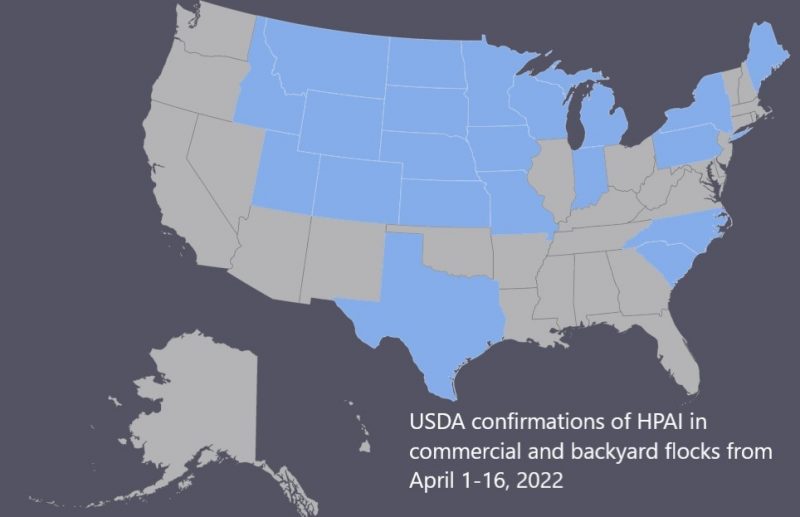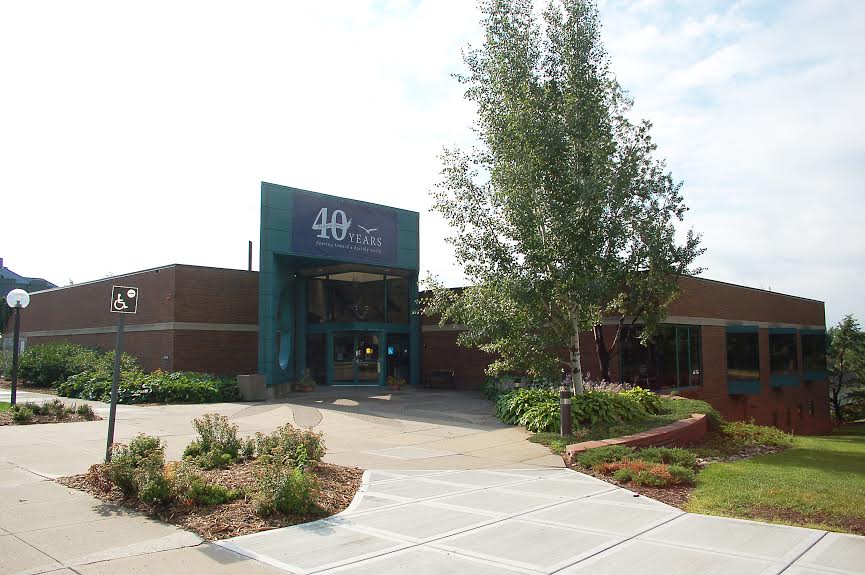Bird flu outbreak: “Take down feeders,” experts say
Posted by
Kelly Kizer Whitt
April 19, 2022
A severe strain of bird flu
A highly pathogenic avian influenza (HPAI) – or especially severe bird flu – is causing sickness among both domestic and wild birds across the United States. So the Raptor Center at the University of Minnesota sent a tweet today (April 19, 2022), recommending that people in U.S. states with HPAI take down their bird feeders and bird baths for a couple months this spring, to help decrease the spread of this virus.
...
--------------------------------------------
...
Bird Feeder Recommendations
The United States is unfortunately experiencing an unprecedented outbreak of highly pathogenic avian influenza (HPAI) in our wild birds. It is important to remember that all bird species are susceptible to HPAI- but how they show or do not show signs of illness and the role they play in carrying and spreading the disease will vary. This virus is shed in the feces and respiratory secretions of infected birds and is very hardy, with virus particles able to survive for weeks in cool, damp environments.
In wildlife, we know the most about how this virus works and presents in waterfowl, shorebirds, seabirds- as these are the groups of birds who are most likely to carry and shed the virus without showing signs of illness.
We know some about how this virus impacts groups of birds like raptors, as these birds often get severely sick and rapidly die from the virus.
Unfortunately, we have a lot of gaps in knowledge about the role of songbirds in HPAI outbreaks. We have some data from previous outbreaks around the world, but this outbreak is very different. The 2022 outbreak is unique because of the very high levels of transmission of the currently circulating H5N1 virus strain in wildlife. With minimal viral surveillance being done with songbirds, it is hard to measure the risk of transmission from songbirds to other birds.
Every day at The Raptor Center, we are seeing the impact of HPAI- as we triage and test birds like bald eagles and great horned owls that are intensely suffering from fatal neurological illness due to HPAI. With these infected birds, humane euthanasia is the only tool we have left to help them. We also know that this strain and outbreak is causing severe illness in other species like geese, ducks, blue jays, and crows.
During these unprecedented times, we recommend doing anything that we can to try and help our wild bird populations. Because the science is unclear on the role of songbirds in this current H5N1 outbreak, one consideration is to not encourage birds to gather together at places such as bird feeders or bird baths. These are places where things like viruses could easily be exchanged between individuals.
In areas with HPAI transmission in any avian species, consider pausing the use of bird feeders and baths for the next couple of months until the rate of virus transmission in wild birds dramatically decreases. Not only will this action help to protect those beautiful feathered creatures that visit your yard, but will also help all wild bird species that are already having it hard this spring because of HPAI. We have it in our power to take a short term action so we are not accidentally assisting in the virus’ spread. This outbreak won’t last forever and I, for one, am greatly looking forward to when I can safely hang my bird feeders back up!
Dr. Victoria Hall, DVM, MS, DACVPM
Hummingbird Feeding Recommendations
Hummingbirds! In the world of bird feeders, hummingbird feeders are not without risk (if we simply look at infectious disease spread). However, they would pose the lowest risk as they tend to have a much more limited group of birds visiting them. In areas with substantial HPAI transmission (check with your state for updated maps), consider pausing or, if you continue to use them, clean them on a daily basis to further reduce risk.
Posted by
Kelly Kizer Whitt
April 19, 2022
A severe strain of bird flu
A highly pathogenic avian influenza (HPAI) – or especially severe bird flu – is causing sickness among both domestic and wild birds across the United States. So the Raptor Center at the University of Minnesota sent a tweet today (April 19, 2022), recommending that people in U.S. states with HPAI take down their bird feeders and bird baths for a couple months this spring, to help decrease the spread of this virus.
...
--------------------------------------------
...
Bird Feeder Recommendations
The United States is unfortunately experiencing an unprecedented outbreak of highly pathogenic avian influenza (HPAI) in our wild birds. It is important to remember that all bird species are susceptible to HPAI- but how they show or do not show signs of illness and the role they play in carrying and spreading the disease will vary. This virus is shed in the feces and respiratory secretions of infected birds and is very hardy, with virus particles able to survive for weeks in cool, damp environments.
In wildlife, we know the most about how this virus works and presents in waterfowl, shorebirds, seabirds- as these are the groups of birds who are most likely to carry and shed the virus without showing signs of illness.
We know some about how this virus impacts groups of birds like raptors, as these birds often get severely sick and rapidly die from the virus.
Unfortunately, we have a lot of gaps in knowledge about the role of songbirds in HPAI outbreaks. We have some data from previous outbreaks around the world, but this outbreak is very different. The 2022 outbreak is unique because of the very high levels of transmission of the currently circulating H5N1 virus strain in wildlife. With minimal viral surveillance being done with songbirds, it is hard to measure the risk of transmission from songbirds to other birds.
Every day at The Raptor Center, we are seeing the impact of HPAI- as we triage and test birds like bald eagles and great horned owls that are intensely suffering from fatal neurological illness due to HPAI. With these infected birds, humane euthanasia is the only tool we have left to help them. We also know that this strain and outbreak is causing severe illness in other species like geese, ducks, blue jays, and crows.
During these unprecedented times, we recommend doing anything that we can to try and help our wild bird populations. Because the science is unclear on the role of songbirds in this current H5N1 outbreak, one consideration is to not encourage birds to gather together at places such as bird feeders or bird baths. These are places where things like viruses could easily be exchanged between individuals.
In areas with HPAI transmission in any avian species, consider pausing the use of bird feeders and baths for the next couple of months until the rate of virus transmission in wild birds dramatically decreases. Not only will this action help to protect those beautiful feathered creatures that visit your yard, but will also help all wild bird species that are already having it hard this spring because of HPAI. We have it in our power to take a short term action so we are not accidentally assisting in the virus’ spread. This outbreak won’t last forever and I, for one, am greatly looking forward to when I can safely hang my bird feeders back up!
Dr. Victoria Hall, DVM, MS, DACVPM
Hummingbird Feeding Recommendations
Hummingbirds! In the world of bird feeders, hummingbird feeders are not without risk (if we simply look at infectious disease spread). However, they would pose the lowest risk as they tend to have a much more limited group of birds visiting them. In areas with substantial HPAI transmission (check with your state for updated maps), consider pausing or, if you continue to use them, clean them on a daily basis to further reduce risk.


Comment